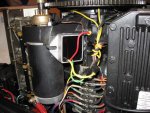Re: If you have high charge voltage, please read
I hold an electrical engineering degree from one of the top 5 engineering colleges in the country (exact pecking order shifts from year to year). So I would put this forward as a definitive answer.
Some Force engine do not have a voltage regulator.
They have a square bridge rectifier only. It is a standard square bridge in a standardized size and shape (about 1" square, less than 1/2" thick, four spade connectors sticking out of bottom, 1/4" hole through middle). Any square bridge rated 40A or higher is as good or better than the original. You can mail order a better than new from Mouser or Ebay for under $5. Voltage rating on rectifier does not matter since the lowest possible rating is 10times higher than what is needed. If it looks even close to right shape then it is. If it has 35A or more then it will work just fine. The holes in spade lugs are not threaded. Force uses US threads (not metric) so you may want to buy a 8-32 tap or some 8/32 stainless self-tapping screws (or crimp spade connectors onto wiring).
Now - about that overvoltage & charging thing:
The battery is your voltage regulator.
If you have overvoltage at engine then there are only a few possible causes.
#1 is that you have your meter set to AC. AC voltage measurement is different from DC. Your boat runs on DC electricity and you need to keep your meter on DC.
#2 is that there is something wrong with your wiring or connections. If the battery cable is too long or if some of the connections are corroded then the engine has to put out extra voltage to compensate.
#3 is that your battery is bad. Just measure the voltage across battery terminals making sure to contact the actual battery posts.
What does this mean?
It means that overvaltage at engine is probably caused by bed battery cabling. If your battery was bad then it would keep going dead and you would be complaining about that instead. Some slight overvoltage at engine is normal because some slight voltage loss in battery cable is normal. If you read 16V at engine and 12V at battery then you are losing 4V in the wiring. This is too much. You will lose 4V when starting too. IMO, you have a wiring problem with wiring that needs to be fixed.
If you have water around your battery then this means that your boat leaks. Batteries use acid.
YOU SHOULD NEVER RUN ENGINE WITH BATTERY DISCONNECTED
The battery is your voltage regulator. If you run engine with battery disconnected then you might fry your stereo, your engine ignition CDI, your depth finder, and any other stuff with small transistors inside.
I hold an electrical engineering degree from one of the top 5 engineering colleges in the country (exact pecking order shifts from year to year). So I would put this forward as a definitive answer.
Some Force engine do not have a voltage regulator.
They have a square bridge rectifier only. It is a standard square bridge in a standardized size and shape (about 1" square, less than 1/2" thick, four spade connectors sticking out of bottom, 1/4" hole through middle). Any square bridge rated 40A or higher is as good or better than the original. You can mail order a better than new from Mouser or Ebay for under $5. Voltage rating on rectifier does not matter since the lowest possible rating is 10times higher than what is needed. If it looks even close to right shape then it is. If it has 35A or more then it will work just fine. The holes in spade lugs are not threaded. Force uses US threads (not metric) so you may want to buy a 8-32 tap or some 8/32 stainless self-tapping screws (or crimp spade connectors onto wiring).
Now - about that overvoltage & charging thing:
The battery is your voltage regulator.
If you have overvoltage at engine then there are only a few possible causes.
#1 is that you have your meter set to AC. AC voltage measurement is different from DC. Your boat runs on DC electricity and you need to keep your meter on DC.
#2 is that there is something wrong with your wiring or connections. If the battery cable is too long or if some of the connections are corroded then the engine has to put out extra voltage to compensate.
#3 is that your battery is bad. Just measure the voltage across battery terminals making sure to contact the actual battery posts.
What does this mean?
It means that overvaltage at engine is probably caused by bed battery cabling. If your battery was bad then it would keep going dead and you would be complaining about that instead. Some slight overvoltage at engine is normal because some slight voltage loss in battery cable is normal. If you read 16V at engine and 12V at battery then you are losing 4V in the wiring. This is too much. You will lose 4V when starting too. IMO, you have a wiring problem with wiring that needs to be fixed.
If you have water around your battery then this means that your boat leaks. Batteries use acid.
YOU SHOULD NEVER RUN ENGINE WITH BATTERY DISCONNECTED
The battery is your voltage regulator. If you run engine with battery disconnected then you might fry your stereo, your engine ignition CDI, your depth finder, and any other stuff with small transistors inside.




















